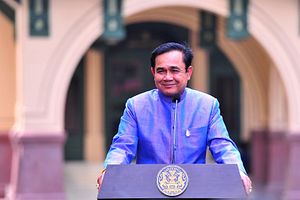Since seizing power in 2014, the Thai junta has dangled the prospect of democratic elections promising the country a chance to make a choice – eventually. After announcing elections and then delaying them several times, longstanding and emergent parties as well as an increasingly fed up millennial generation have signaled an unwillingness to wait much longer. For the junta, which still hopes for the electoral victory of a military-leaning political party, further delays risk inciting the very upheaval it promised to stamp out.
The influence of ousted sibling prime ministers Thaksin Shinawatra and Yingluck Shinawatra still looms heavy over the Pheu Thai Party (PTP), despite them living in self-imposed exile and technically holding no official title within the party. The pair have traveled through Asia in recent months drawing the ire of the junta following reports of PTP members meeting governments abroad. In February, the government said legal officials were investigating the reports for possible violation of the constitution, which forbids “outsiders” from having any influence on political parties.
PTP immediately denied any involvement of the Shinawatra clan in the political doings of the party, saying any meetings were merely social affairs. Plans to have Thaksin appear via video link during Songkran festivities at the start of the month were abandoned, with senior PTP figure Watana Muangsook telling The Bangkok Post the party wanted to safeguard its own existence and not invite further scrutiny from the junta.
The party also this month formally registered its intention to contest elections, slated for February but reliant on the whims of the junta, in the first of a number of steps loosening the reins on political activity. While the party is reluctant to do anything too controversial, PTP is still expected to enjoy strong support from the working class and rural voters who initially flocked to the party under the Shinawatras. Prajak Kongkirati from Bangkok’s Thammasat University told Associated Press the party is seen as the “one choice” for Thai voters who identify as progressive and against the coup.
Thanathorn Juangroongruangkit is aiming for another option. As the co-founder of Future Forward, one of a handful of newly formed parties which registered with the Electoral Commission in March, Thanathorn is hoping to offer non-rural and anti-junta Thais a second choice. Comparing himself to France’s Emmanuel Macron in an interview, the billionaire is set to establish a platform of reforming the constitution, fighting corruption, and developing a decentralization campaign.
While longtime watchers of the region doubt Future Forward could make much of an impact at any eventual poll, Thanathorn demonstrates an innate understanding of the party’s chances – he doubts there will be a vote next year at all – which curbs criticisms of yet another billionaire entering the Thai political fray for personal gain or glory.
And those who disagree with the junta, whether they are natural PTP supporters, would-be Future Forward cadres, or something else, are beginning to make their voices heard. Reports of students protesting the junta are increasing, most recently with the brazen move of a small group of students brandishing signs calling Prime Minister Prayut Chan-o-cha a ‘dictator’ ahead of his speech in Bangkok. “How clever of you! When the country is ruined, don’t forget to come out like this, too,” Prayut reportedly replied.
Instances like this, and others targeting Deputy Prime Minister Prawit Wongsuwan, invoke Thailand’s strong history of youth and student-led demonstrations against authority. The role of young Thais has been vital to changing the political system in the past, even if it is often bloody and tumultuous. This is clearly weighing on Prayut and others in the junta. The threat of a well-documented, heavy-handed pushback against vocal dissenting students has been enough so far to restrict the junta’s public response to mere words.
Instead, Prayut appears to prefer threatening further delays to elections. After a demonstration featuring over 300 democracy activists at the army headquarters in Bangkok in late March, Prayut again raised the prospect of further delays. Smaller protests since confirm what many Thai voters and watchers already knew – a February poll date should only be penciled in on calendars.

































